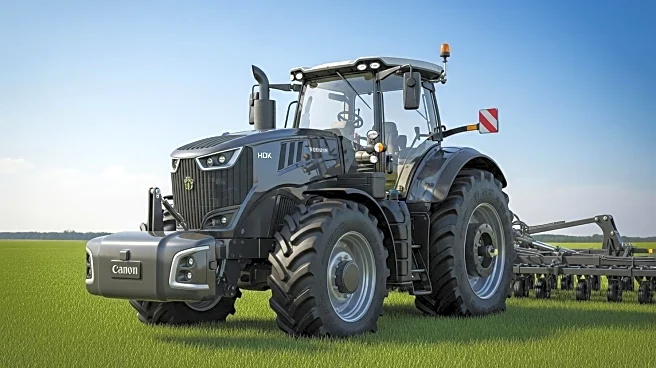What's Happening?
The United States agricultural machinery market is projected to experience significant growth driven by technological innovations aimed at enhancing efficiency and sustainability. The market, valued at USD 140 billion in 2020, is expected to reach USD 205 billion by 2028, growing at a compound annual growth rate (CAGR) of 7% from 2024 to 2031. Key players such as AGCO Corp, CNH Industrial N.V., and Deere & Co. (John Deere) are focusing on precision and autonomous technology to address labor shortages and improve productivity. Recent developments include the introduction of autonomous grain carts and the expansion of autonomy products for planting and harvesting. Additionally, there is a growing emphasis on eco-friendly solutions, including electric and hybrid machinery, to promote sustainable farming practices.
Why It's Important?
The anticipated growth in the agricultural machinery market is crucial for the U.S. agriculture sector, which faces challenges such as labor shortages and the need for sustainable practices. Technological advancements in machinery can lead to increased efficiency and productivity, helping farmers manage resources better and reduce environmental impact. Companies investing in future technologies, such as Deere & Company's $20 billion investment in manufacturing upgrades and autonomy software, highlight the industry's commitment to innovation. This growth can benefit farmers by providing more efficient tools and potentially reducing operational costs, while also supporting the broader economy through job creation and technological development.
What's Next?
As the market evolves, stakeholders can expect further advancements in autonomous and precision farming technologies. Companies are likely to continue investing in research and development to enhance their product offerings and maintain competitive advantages. The focus on sustainability will likely drive the development of more eco-friendly machinery, aligning with global trends towards reducing carbon footprints. Additionally, the expansion of distribution centers, such as AGCO's new facility in California, indicates a commitment to improving supply chain efficiency and customer support. These developments suggest a dynamic future for the agricultural machinery market, with potential benefits for both producers and consumers.











